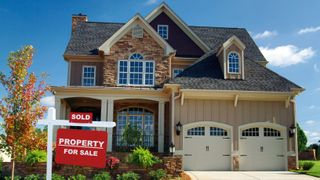Bricks and broadband: why internet speed should determine your next home
Don't bet the house on a crap connection

What's a decent broadband connection worth? According to some reports, it could account for as much as 20% of the value of your home.
Never mind homes built on flood plains, homes on fire or homes next door to Piers Morgan: it seems that the thing that scares homebuyers more than anything else is a crappy connection.
The news comes as property portal Rightmove adds a broadband checker to every listing, enabling you to see at a glance what kind of connection you might expect from your potential purchase.
The widely reported 20% figure didn't actually come from Rightmove - it was added later by a man talking to a newspaper - but the survey of 3,000 homebuyers did find that broadband information was more important to many than information on transport links and nearby schools.
It seems that we'd rather send the kids to school in Kevlar uniforms than endure shoddy streaming - and quite right too. Bad broadband is increasingly becoming a deal breaker, and if it's not on your list it should be.
If you're considering moving to a place where people still point at planes and dial-up is considered pretty cutting edge, you could be making a big mistake.
Home is where the coverage is
"Good luck streaming UltraHD video down pipes put in to keep Edwardians entertained."
Get daily insight, inspiration and deals in your inbox
Get the hottest deals available in your inbox plus news, reviews, opinion, analysis and more from the TechRadar team.
It's not just about house prices and it's not just about broadband: even if you've found your forever house and intend to stay there until they carry you out in a box, moving somewhere without a decent broadband connection or decent mobile coverage could mean a pretty miserable experience.
We're in the dying days of landline phones and data delivered on discs; good luck streaming UltraHD video down pipes put in to keep Edwardians entertained.
This matters because online services - and with everything moving online, soon that will mean all services - generally cater for the majority and often don't really care about anybody else.
For example, when we were all on dial-up internet designers tried to keep their website home pages below 40Kb. Now the average home page is nearly a megabyte and a half - fine on broadband, but bloody awful when even 3G isn't available in your area.
Don't assume that things will get better, either. The government may promise superfast broadband for all, but organisations such as the Royal Society of Edinburgh Digital Scotland working group reckon that the prospects for some rural areas are "dismal" and that the EU target of 30Mbps for everyone by 2020 is hilariously optimistic.
It's a vicious circle, because broadband and mobile broadband targets are based on population rather than geography - so naturally enough, providers focus their energies on where the people are, and increasingly people won't move to the places where broadband and mobile broadband aren't up to speed.
It's not all bad, though. Organisations such as INCA, which runs a notspot registration scheme, can encourage smaller firms to make investments that the big ISPs won't consider, and the Public Accounts Committee is making threatening noises about the secrecy surrounding BT's contracts to roll out rural broadband - contracts whose costs, the PAC says, could be reduced by up to 35%. That would help make some rural roll-outs more cost-effective.
For now, though, it pays to be picky. If the coverage is crap and the broadband basic at best, it probably isn't the right place for you.
Writer, broadcaster, musician and kitchen gadget obsessive Carrie Marshall (Twitter) has been writing about tech since 1998, contributing sage advice and odd opinions to all kinds of magazines and websites as well as writing more than a dozen books. Her memoir, Carrie Kills A Man, is on sale now. She is the singer in Glaswegian rock band HAVR.
Most Popular



